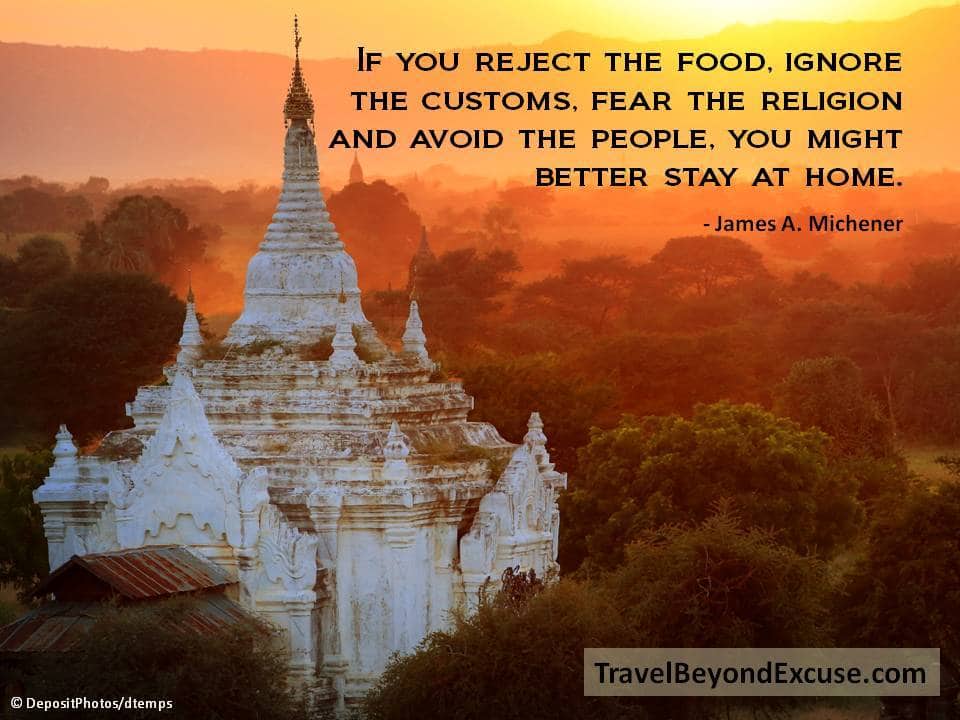Results of My Travel Survey

(c) DepositPhotos/antimartina
I received an overwhelming response to the travel survey I put out recently–much better than I expected, actually! Thank you so much to those of you who participated!
So if you are curious about what people said in my survey, I’ll share some of my findings and conclusions and a couple of stories. (And by the way, if you are interested in this course, CLICK HERE.)
The results were pretty interesting. On the first question, which was “How often would you travel abroad if there were NO obstacles standing in your way,” can you guess what the most popular response was?
I thought it would be “I’d travel at least once a year,” on a classic bell curve pattern where the choices before and after it would progressively drop in number. I figured at least a few people who weren’t that enthusiastic about travel (I do know a few) would reply with “Not interested” or “I’d travel abroad once every few years.” But no, with the exception of two people who said they prefer to travel within the U.S., every single person who has replied so far said they would travel abroad at LEAST once a year, with even more checking the box for traveling at every possible opportunity, and the majority checked the box saying they would actually live overseas for months or years at a time! So the graph actually looked more like a steep mountain climb. Wow! People definitely want to travel more.
The responses to my second question, “What top 2 obstacles do you need to overcome before your travel dreams become a reality,” fell into several categories: money, responsibilities, fear, travel logistics, and issues to overcome for those who want to travel more long-term. I’ll break down some of the responses I got for each of these categories:
1. Money

(c) DepositPhotos/Sehenswerk
This one wasn’t too surprising to me. Of course, this was the obstacle everyone mentioned most frequently, and sometimes this was the ONLY barrier they listed even though I asked for the “top two” obstacles. “1. Cost. 2. Um….cost.”
Finances. Expense. Affordability. Debt. These money-related words popped up again and again. Boy, am I familiar with this one. I’ve had the student loans, car payments, mortgage, credit card debt, and $600 vet bill, too–and know the realities of living paycheck to paycheck and juggling credit card balances from one card to another.
Teachers in particular don’t make a ton and buy a lot of things for their own classroom each year already. I can relate to this, too–as a school teacher I was provided with far fewer resources than what I needed, and I bought many of the books, tapes (those things we used before CDs and MP3 players) and other materials I needed to be effective in my classroom.
I didn’t grow up rich, either. My younger sister and I were raised by a single mom. There were actually events in my childhood which help me to identify well with my grandparents’ generation. Living without running water and electricity. Running out of food. Living without a car or TV or phone or refrigerator. Selling bread door-to-door to make ends meet. I had a mostly happy childhood and never really thought of ourselves as “poor,” but I guess technically we were, financially speaking.
Some responders would like to learn the best way to obtain frequent flyer miles. It’s a confusing topic for many people, and some have been drawn in to points programs that turn out to be less than worthwhile–maybe even “scammy.” Using frequent flyer miles to pay for airfare expenses is a big strategy I have used to fly all over the world for almost nothing (all I pay is fees and taxes). Investing a little time in learning how these programs work can be a life changer–it certainly was for me. It isn’t hard. I’ll definitely be talking about this subject in my course, clearing up a lot of confusion and myths about it.
In a world where the media and travel industry itself paints travel as a costly luxury, it’s easy to see how so many people feel it is nearly impossible to finance a trip. Money is going to be the main topic I will address in my course, because with the investment of a little effort I believe this barrier can absolutely be overcome. Where there is a will, there is a way!
2. Responsibilities

(c) DepositPhotos/itsmejust
Feeling obligated to visit family during holiday breaks. Taking college and continuing education classes. Working toward Master’s degrees. Community and church commitments. Families. Elderly parents. Children. “My two kids need to graduate high school and move out,” one person wrote.
One of the toughest obstacles to overcome is to create the flexibility of life to make the time to travel. Many people, even teachers with their school breaks, feel like they don’t have a long enough free time to board an international flight. They just have too many other responsibilities in life.
Several people mentioned that they have pets that make staying away for long periods of time difficult. Maybe they can find temporary sitters for them, but staying away for very long is tough. We have a pet, too, and we’re very lucky to have family members who are willing to care for her during our extended absences–I know other people are not so fortunate.
Second jobs. Spouse’s jobs. “I just don’t see how I could jeopardize my livelihood when we are struggling,” wrote one person. When times are tough and you or your spouse need to take on any work you can to make ends meet, finding time to travel amid such busy work schedules can be especially difficult and stressful.
This is admittedly one of the toughest obstacles to address. Some responsibilities are easier to delegate or remove than others. I am looking forward to addressing some strategies in my course that I have found useful and that I know others have used successfully in order to “redesign” their life to allow for more travel.
3. Fear
People don’t always admit this outright (or even to themselves), but fear is a major factor that prevents many from traveling, even if they have the time and money to do so. They may make other excuses for why they “can’t,” but down deep it is about getting past the tipping point/intimidation factor.
We have the media to thank for the majority of the travel-related fears people have. Every night on the news we see horrible things happening in other countries. When people learn that I travel a lot, some react by saying that I must be very brave. “Aren’t you scared?” some ask me.
Frankly, I think it’s very sad that people are so scared of the rest of the world, and it’s one reason I’m so passionate about getting more people to travel–especially people in positions of influence, like teachers. We humans tend to fear what we don’t know. Let’s turn off that hype-filled, fear-inducing news channel and really get to know each other and realize that we don’t really have so much to be afraid of, after all! Despite cultural differences, humans are overwhelmingly good and kind, and the more you travel and interact with the world, the more you see the goodness of people.
Bad apples live everywhere, including your own neighborhood. You have to be smart and aware of those people, take some common-sense precautions to stay safe, and then just get out there and enjoy the world. As Chris Guillebeau says, “There are few goals worth pursuing that are totally risk free.”
While pockets of violence tend to erupt here and there, these events are often much more isolated and small-scale than what the media portrays. I recall reading a story where a man from another country was going to travel to the United States. “Aren’t you scared?” his friends asked him. “I saw those buildings being blown up on TV!” (referring to the events of 9/11). The rest of the world is mostly like that, too. Pockets of violence in an otherwise peaceful land. With rare exceptions, the most common type of crime you’ll encounter is pick pockets and scammers, not violent crime.
In my course I plan to address some basic safety precautions travelers should take, and share some of the common scams people encounter and how you can avoid them. I don’t plan to spend an awful lot of time on this topic because it is largely just about common sense! Rather, I’d like to tackle some of the deeper issues surrounding people’s fear of travel. I’ll explore some of the psychological barriers that hold people back from traveling as much as they would like to, and hopefully challenge my students to blast these barriers to the ground.
Several people wrote of their fear of not being able to communicate in a non English speaking country. I remember the first time I planned a trip to a country where neither English nor Spanish (the two languages I speak) were widely spoken. Even though I was going with a group for that particular trip (a volunteer trip in which we would be working with orphans in Romania), I remember feeling apprehensive that for the first time in my adult life I would not be able to easily communicate with the locals around me.
On that trip I made two important discoveries. First, it isn’t too difficult to learn a handful of basic phrases in a new language, and the small amount of effort that goes into doing this pays off in a big way through increased interaction, trust, respect, and appreciation from the locals. Second, I found the challenge of not understanding everything going on around me and the effort that went into communicating with people actually very thrilling, exciting and invigorating in many ways! Yes, I also felt frustrated and apprehensive and embarrassed at times, but this is part of the adventure and challenge of travel, and in the end it always works out and makes for some great stories. Many people discover that English is also commonly spoken in many areas of the world, especially places frequented by travelers. I have spent several years of my life teaching Spanish and studying language teaching and learning methods, and in my course I will be sharing several very practical tips and resources for dealing with language barriers.
Some people who responded said they were dealing with some personal medical issues. Honestly, I don’t plan to deal with the barrier of existing health issues in my travel course because this is something that will not apply to the majority of the people in the class, and for those to whom it does apply it’s going to be a case-by-case situation that will depend on the medical condition and the facilities available in the destination country, and would probably be better researched individually and discussed with one’s personal healthcare professional. What I will address in the course is how to seek medical help should it be necessary, and if there is medical insurance that should be bought before travel.
A couple of people wrote that they were concerned about how to find acceptable food. As a vegetarian, I know that finding food to accommodate special diets is an ever-present concern. Whenever I prepare to travel to a country where I don’t speak the local language, one of the first things I do is learn the phrases for “I am a vegetarian” and (because many people don’t know what that means) “I can’t eat meat, fish, or chicken.” I have friends on gluten-free diets and others who have certain food allergies and sensitivities that they must constantly be on guard for. I’ll be touching on this in my course, with some tips and guidelines to follow for people with special dietary needs.
Other concerns that came up included the fear of flying and the general fatigue of travel–sitting in a cramped seat for hours on end, dealing with jet lag, and the generally less glamorous realities of travel, which is certainly valid and one of the necessary sacrifices if you want to make travel a part of your lifestyle. It’s not always comfortable and wonderful, and that’s enough for some people to say, “It’s not for me.”
4. Travel Logistics

(C) DepositPhotos/ventanamedia
I also heard from people who had questions about family travel. One person said they would like to include grandchildren on a future trip. Of course, many people will be traveling with their children. My husband and I plan to take all our nieces and nephews on international trips, too, so family friendly travel is something that I am interested in even though I do not have children of my own. Taking kids on international trips is one of the greatest experiences you can bestow on them, in my opinion. Let them get to know the world first-hand! What a great education! Imagine when they go back to school and read about places in their history and geography books and can say, “I’ve been there!”
I’ll touch on the topic of family travel in my course, though most everything I know on this topic is not through personal experience, but from what I know of families who have traveled successfully.
Others want to learn about “must see” sights around the world, and how to obtain appropriate visas.
My travel course will touch on some of the nuts and bolts of planning out a trip, deciding what to see, and finding the necessary information in terms of visa requirements, vaccination requirements, etc. for the planned destination.
5. Long-Term Travel

(C) DepositPhotos/TpaBMa2
For the many people who expressed interest in traveling or moving abroad for extended periods of time–months or years–other logistical problems arise.
“When you have a child and you want to move for months, how do you deal with schooling?”
“How can I find work in a foreign country that I would want to stay in for an extended period of time?”
“How can I continue to conduct my personal businesses while traveling?”
“What if my life partner doesn’t believe that we could make it work (and work well) to live overseas?”
Not everyone has a desire to spend months or years abroad, so I won’t be dwelling on this particular topic for long, but I will be addressing a few general questions, especially those that apply to teachers with a normal teaching schedule who could, in theory, live abroad for a couple of months every summer or even teach abroad for a year or longer! My mom, sister and I lived in Mexico for 5 years when I was a kid, and it was the best experience of my life.
If you can get away for long chunks of time like this, it’s a very fulfilling way to travel, and also can be extremely affordable, depending on your destination and travel style. Often you’ll end up spending far less than if you were to simply stay home! If there is enough interest, I may eventually create a separate course dealing specifically with long-term/slow travel and the logistics of working abroad, etc. (Please do let me know if you’d be interested in such a course.)
One kind response to my survey said: “I need to know everything in Lily’s head. I was thinking last week how you need to offer a class.”
Thank you! I’ve been planning this course for a long time, and I’m really excited to release it soon! CLICK HERE to sign up for my free teleseminar, where I’ll teach some great travel tips and provide some more information about the course!
Another responder asked, “Sorry, we are not teachers… do we still qualify to take the course?”
Yes! I’ll be speaking to the particular needs and situation of teachers (who are typically off work on regular holiday times and summers and who typically do not make a huge income), but the principles will apply to many others! The people who might especially benefit from this course are:
- Parents of children in elementary or high school
- Other school employees or people with careers that revolve around school holidays
- College or grad students
- Retirees
- People with a strong desire to travel and sense of adventure
If the main barrier to travel is one of the things in the categories I mentioned above–especially finances–people will find value in this course.
Who is this course not for? Obviously, it’s not for people who aren’t excited about traveling. It’s not for people who refuse to leave their comfort zones (travel will be one of your greatest personal development experiences–and it’s not always comfortable!), and people who don’t like to try new things.
In other words, this course is absolutely not for my father-in-law, who loves routine and predictability, hates to be away from home for more than 3 days, is content to spend every summer holiday at the same lake 45 minutes away from his house, and is apprehensive about foods that are not steak and mashed potatoes and dessert.
James Michener famously said, “If you reject the food, ignore the customs, fear the religion and avoid the people, you might better stay at home.”
For those yearning to experience the world, wanting to make travel a regular part of their lifestyle, and willing to think outside the box and try some unconventional (but proven) travel hacking tricks, this course will change lives.
So what’s YOUR biggest obstacle to traveling as much as you’d like to? Share in the comments below, and let’s see if we can find a way to overcome it!
Want to learn more about the class I’m getting ready to present? SIGN UP HERE to stay in the loop and get some free bonuses, too!




